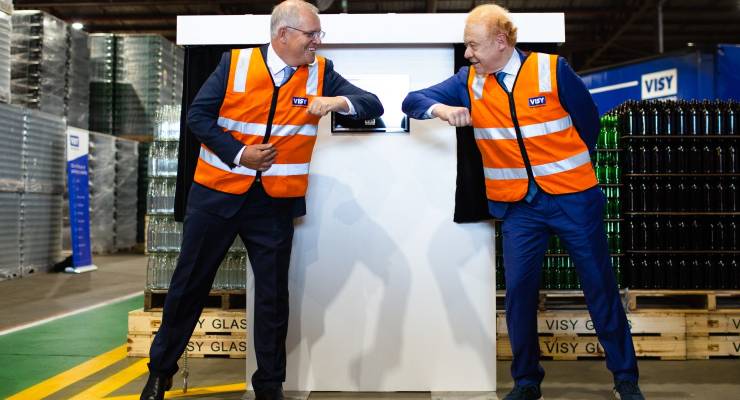
Despite being a long-time US resident as head of what is called in the US Pratt Industries, Anthony Pratt can’t donate to American politicians. US laws ban political donations from foreigners — something Australian laws only prohibited relatively recently.
That didn’t stop him from spending a small fortune successfully cultivating Donald Trump via his Gold-Coast-on-steroids Mar-a-Lago club. The money enabled Pratt to form a “friendship” — or about as close to friendship as a sociopath like Trump can manage — with the then-president, who allegedly shared national security secrets with Pratt, along with sordid gossip and an insight into relations with other countries.
We only know about this because Trump is being prosecuted for mishandling classified documents he illegally retained after losing the 2020 election — part of a freewheeling approach to national security that saw him not merely share classified information with foreign civilians such as Pratt but with senior Russian officials as well.
No US-style restrictions on donations exist for Pratt in his home country, which prompts the question of why he hasn’t done exactly the same thing in Australia — spend millions to secure access to political leaders with the aim of exerting influence and extracting information.
We know that he has spent millions — $9.46 million in the past decade, according to Electoral Commission records, mainly in the periods before elections and mostly to the Liberal Party, but increasingly to Labor in recent years.
And we know it bought him access. Pictures abound of Pratt with prime ministers over the past decade — especially with a smirking Scott Morrison, who joined Trump and Pratt at a Pratt-owned packaging factory in Ohio in 2019, where Morrison labelled Pratt the “Don Bradman of job creation”.
But don’t be misled by either the preponderance of Pratt cash or the photos — Pratt also hosted fundraisers for Bill Shorten and Daniel Andrews at the Pratt family’s Raheen mansion in Melbourne — a place familiar to Shorten given his relationship with cartel operator Richard Pratt, a subject Malcolm Turnbull liked to taunt Shorten about.
Crikey has previously talked about Australia’s two-speed democracy, in which donors get privileged access to decision-makers while the rest of us make do with a vote every three years and sending letters to MPs. But Pratt — courtesy of his “superpower”, money — is in another world of access altogether, enough to make regular donors blanch.
All of this has occurred in plain sight. It hasn’t taken a prosecution of a corrupt politician to expose Pratt’s top-notch influence game. It’s been plain in records of his perfectly legal donations, press coverage and media photos. And it’s been accepted as normal by the political class.
If none of the slew of Australian politicians close to Pratt have had the ethical vacuum and poor judgment of Trump, it remains a live question of what information Pratt obtained while spending extensive time with them, information that wasn’t available to voters or commercial competitors.
Pratt hasn’t figured in the discussions about political donation caps triggered by Clive Palmer hurling tens of millions of his own cash at his own party in a mostly unsuccessful effort to impose dolts and dullards on Parliament. Pratt has the sheen of the Melbourne establishment to protect him, unlike the garish Queenslander, and by any standard has been in a far better position to wield influence than Palmer.
Labor has been talking about some long-overdue donation reforms — lowering the disclosure threshold, real-time reporting — since it was elected, but apart from a flurry of speculation when the Joint Standing Committee on Electoral Matters reported earlier this year, there’s been nothing concrete from Special Minister of State Don Farrell.
Donation caps alarm teal MPs who benefited from Climate 200 donations, and the suspicion that the major parties will ensure the fix is in to preserve their diminishing grasp on Parliament looms large. But as the efforts of Pratt make clear, the current donation system allows the mega-rich to traffic in influence at the highest levels — especially if they’re a storied member of the Australian business community.
Should Labor make donation reform a priority? Let us know by writing to letters@crikey.com.au. Please include your full name to be considered for publication. We reserve the right to edit for length and clarity.








But, but, but …. Australians don’t want special interests or elites to have a “voice” which the rest of us don’t have!
The elites already have that access – called political lobbyists
Really!
Nah…….
We’d have to have a national vote to allow that……
Assuming this comment has a sarcasm alert
Pratt’s superpower was inheriting $4Bn. The Don Bradman of inherited wealth.
It was always a bit of a niggle to our billionaires that the indigenous were possibly going to get similiar access as their good selves without paying the bribes for it. How is that fair?
Fortunately our dumb electorate put a stop to that rort.
Seems ironic that all those conservatives lobbyists who promoted a NO vote in order to prevent an ‘elitist inspired’ indigenous voice, are absolutely silent when it comes to the voice of the rich and powerful to parliament and the executive government. Seems that some ‘elites’ are more equal than others…
It seems that Australians have voted to keep the Voice to politicians relative to the bank balance of those wanting consultation.
And those who were politicians such as Paul Keating, Pratt really opened the wallet for this guy $300,000 a year ‘retainer’.
Bit of shade thrown, there… nice work! Perhaps we could write this on a whiteboard, somewhere?